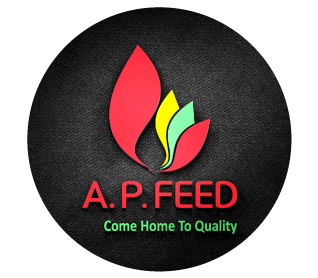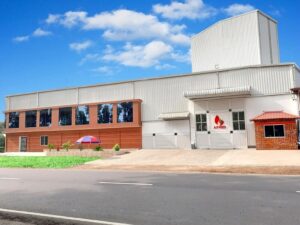
Abdullah Poultry Feed Mill (AP Feed)
AP Products is a leading provider of high-quality animal nutrition products for livestock & poultry farming. Their product range includes a variety of poultry feed formulations for chicken, broiler, layer, sonali, and cattle farming, containing a blend of grains, protein sources, vitamins, and minerals. AP Products also offers a range of feed additives such as probiotics, enzymes, antibiotics, and coccidiostats to enhance the nutritional value and health of the feed. With a focus on feed safety and quality, AP Products is dedicated to supporting healthy and productive poultry farming.
Abdullah Poultry Feed Mill (AP Feed) is envisioned to provide quality products and services to enrich the agriculture sector of Bangladesh. In order to materialize this vision, AP Feed has adopted progressive agricultural practices, a dynamic and proactive management team, improved marketing techniques, and modern processing in production facilities to enable the industry to improve its quality and expand production levels significantly.
Abdullah Poultry Feed Mill (AP Feed), as a company possesses business ethics, creates moral values, obtains customer satisfaction to its highest limit, follows strategic organizational behavior, controls the International standard corporate culture, and supplies poultry and cattle feed at the highest grade, day-old chicks and breeder solutions and consultancy. We are committed to total quality management and dedicate our total efforts and valuable time to ensure that our customers are treated with the best value for their money spent.
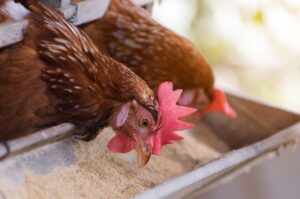
Historical development, poultry sector Bangladesh
Historically, backyard farming provided the sole source of chicken meat and eggs in Bangladesh. Chickens were reared to meet family demands and productivity levels were low. The modernization of The poultry sector started around 1960 with the import of modern breeds, equipment and marketing Systems. From that point onwards, the Bangladeshi poultry sector gradually shifted towards a Commercial industry. Before 2000, commercial broiler and layer farms were dependent on imported Parent Stock (PS). At the beginning of the new millennium, several local companies started their parent and Grand Parent (GP) operations to meet the country’s demand. The most commonly available broiler strains are Cobb 500, Ross 308, Indian River, Tiger Sasso, Hubbard and Arbor Acres, whereas the most reared layer
strains are Novogen Brown/White, Hyline Brown/White, Shaver 579, ISA Brown/White and Bovine White.5 Starting from the 1990s, the poultry sector experienced a significant growth of approximately
15-20% annually, until the outbreak of AI in 2007. In 2007-2008, 60% of the poultry farms and 70% of The hatcheries and breeding farms were closed due to this outbreak.
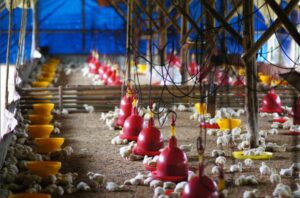
The poultry sector in Bangladesh
The poultry sector in Bangladesh plays an important role in the country's economy and food security. Poultry farming is one of the fastest-growing industries in Bangladesh, with a high demand for chicken meat and eggs. According to the Bangladesh Poultry Industries Central Council (BPICC), the poultry sector contributes around 3.5% to the country's GDP, with a turnover of around Tk 1,000 crore per month. The sector employs over 3.5 million people, including farmers, workers, and traders. There are both commercial and small-scale poultry farms in Bangladesh. The commercial farms use modern technology and equipment to produce large quantities of chicken meat and eggs for the domestic and export markets. The small-scale farms, on the other hand, are typically family-run operations that produce chicken and eggs for local consumption. One of the major challenges faced by the poultry sector in Bangladesh is disease outbreaks, such as avian influenza and Newcastle disease, which can cause significant losses for farmers. In recent years, the government has implemented various measures to control these diseases, including vaccination programs and quarantine measures.
Overall, the poultry sector in Bangladesh has significant potential for growth and development, and the government and private sector are working together to address the challenges faced by the industry and to promote sustainable and profitable poultry farming practices.
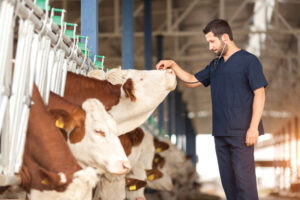
Animal health & Disease control
The Bangladeshi commercial poultry sector experienced rapid expansion over the last years, however, poultry diseases constrain further development and hamper the industry’s productivity. During recent years, about 30% of the poultry flock in Bangladesh died annually due to several disease outbreaks. Many of these diseases also pose hazardous threats to human health. The occurrence of poultry diseases in an area depends on various factors such as the quality of monitoring of the bird population,
Management practices, Geo-climatic conditions and immunization35. For instance, improper control over the volume of air, containing ammonia from chicken litter, is detrimental to the growth of birds. The emerging diseases and unknown causes result in farmers’ losses, high bird moralities and human health threats. To reduce the occurrence of diseases and improve poultry health, disease control and diagnostic laboratory (capacity and capabilities) are key. Bangladesh is characterized by poor service delivery in the form of veterinary, vaccination and disease control services. The policy of the MoFL is to strive for sustainable rural development, improve food security & food safety and reduce the usage of antibiotics. To successfully execute this policy, good governance, transparency and communication are required. It is important to improve cooperation between ministries, including veterinary diagnostic services, poultry farmer associations, private sector parties in the poultry sector, and universities of veterinary science. However, an integrated network to enable cooperation is lacking in the current Bangladeshi poultry sector. Also, farmers do not adhere to the standard of not feeding their birds with antibiotics 7-10 days before slaughter. Additionally, there is no nationwide systematic approach to collecting and sharing data on poultry diseases (government, veterinarian and farmer level) in Bangladesh. As almost none of the carcasses are sent for post-mortem diagnosis, Bangladeshi stakeholders are often unaware of current diseases. Bangladesh lacks veterinary diagnostic capacity, related to know-how, lab equipment and quality assurance systems of international stature. This results in limited testing of residuals in and contamination of meat and the quality of vaccines and medicines amongst others. To achieve more timely disease detection that will lead to more effective control, strengthening surveillance and enhancing laboratory capacities is required. Disease control protocols and measures are often non-existing at farms. Poultry farmers lack awareness about protocols for operations such as disinfection methods, water quality and litter management, all important to reduce the risk of animal diseases spreading. As a result of the poor. In animal health and disease control practices, farmers and veterinarians often use inadequate medication such as high levels of antibiotics, which results in a substantial cost for farmers, potential resistance among flocks and vast risks for the human health population.
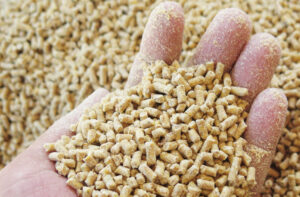
Feed
Historically, cattle and poultry farming in Bangladesh revolved around the use of homemade feed from
different types of agricultural by-products and kitchen waste. Gradually, the demand for commercially
mixed feeds increased at the expense of home-mix alternatives, resulting in better livestock
performances.
The Bangladesh feed market produced approximately 7 MN MT feed in 2019, of which 5 MN MT is
considered as commercial compound feed, the remaining being home-mix alternatives. Out of the
commercial feed, 36% or 1.8 MN MT can be attributed to the broiler segment and 24% or 1.2 MN MT
to the layer segment. Both layer and broiler feed production have been growing substantially and each
respective market volume has doubled over the last 6 years. Due to the strong growing demand for
eggs, the demand for layer feed is expected to grow faster than broiler feed, reaching 1.9 MMT in
2025, whereas the broiler feed market is expected to reach 2.3 MMT in 2025.
Compared to other Asian markets, the feed sector in Bangladesh is relatively fragmented as the top11 sector players represent 65% of the domestic feed production.
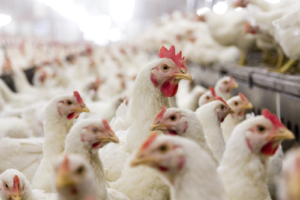
Vaccines and medicines
Bangladesh has been affected by avian influenza (AI) on 43 different occasions since 2007. Major outbreaks of AI occurred in 2007, 2009, 2011 and as recently as 2017. To combat the outbreaks, the Bangladeshi government adopted a national preparedness and response plan in 2007. According to the plan, all birds needed to be killed and buried to stop the outbreak. The Bangladesh Ministry of
Fisheries and Livestock is responsible for compliance to the act. In the entire market, around 5,000
veterinarians are employed by the private sector whereas the Bangladesh government institutes have
about 3,000.
Health issues in poultry are a major cause of concern as they have an inverse relationship with farm
profits and working conditions. Veterinary vaccines can play a vital role in the prevention of disease
outbreaks. Currently, few vaccines are manufactured locally by the Bangladesh Livestock Research
Institute (LRI). The amount and variety of vaccines produced by the LRI is not sufficient to meet the
national demand. As a result, most of the available vaccines are imported. Imports cause farmers to
use vaccines while they are unaware whether the vaccines are consistent with the circulated
Pathogens in the field. Moreover, Bangladesh experiences difficulties in maintaining an uninterrupted
cold chain system during transport of the vaccines.
Figure 18 provides an overview of all vaccines for poultry and other large and small animals available
in Bangladesh, split between locally manufactured and imported vaccines. Contact details of the main
poultry medicine vendors are listed in Annex 5.
In terms of segmentation, RENATA Pharmaceuticals is the largest player in Bangladesh in the animal
health segment, with a 22% market share. Other players active players are ACI (12%), ACME (10-12%),
Square (7-8%), Elanco (7-8%), SK-F (7-8%) and Opsonin and Popular.
A commonly problem faced with pharmaceuticals being imported in Bangladesh is the insufficient
testing capacity. Bangladesh only has one testing laboratory in the port which is a bottleneck. Products
can be stored for free during the first 7 days. After that, importing players are required to pay a charge
of USD 35 per day/per container, which is considered as substantial.
According to the Bangladesh Veterinary Practitioners Ordinance, only registered veterinarians are
allowed to prescribe medicine or to perform surgery. In the field, three segments of veterinarians are
practising: (1) feed company veterinarians, (2) pharmaceutical company veterinarians (‘technical
officers’) and (3) government authorized veterinarians. However, not only registered veterinarians but
also non-veterinarian personnel and farmers use antimicrobials without a confirmatory diagnosis.
Antibiotics are indiscriminately used in poultry diet, both for broiler and layer, as growth promoters
and to control infectious diseases. Commonly used antibiotics are aminoglycosides, tetracyclines, betalactams, quinolones, macrolides, polypeptides, amphenicols and sulfa drug. Particularly smallholders
and medium-size farmers believe that they should include antibiotics within their daily operations
without consulting the relevant experts (veterinarians), making them unaware of application practices,
effects and quantities to use. Feeding poultry with high quantities of antibiotics could result in antibiotic-resistant bacteria amongst others. Additionally, the majority of the farmers do not use
finisher feed required to maintain the withdrawal period of antibiotics which leads to (high levels of)
residuals of chemicals in the poultry meat. Even at the day of harvest or at wet markets, live birds are
still treated with antibiotics and fed with grow-out feed. Human health can either be affected directly
through residues in meat, which may cause residual side effects of antibiotics in human health, or
indirectly, through antibiotic resistance bacteria spread by animals to humans, posing serious health
threats.
